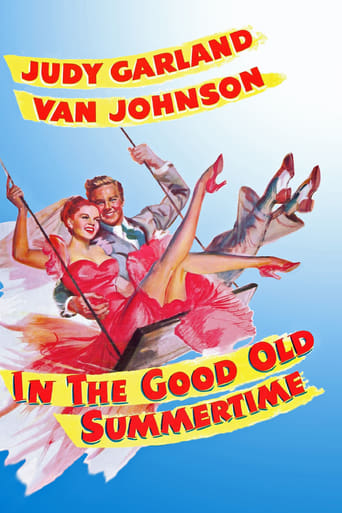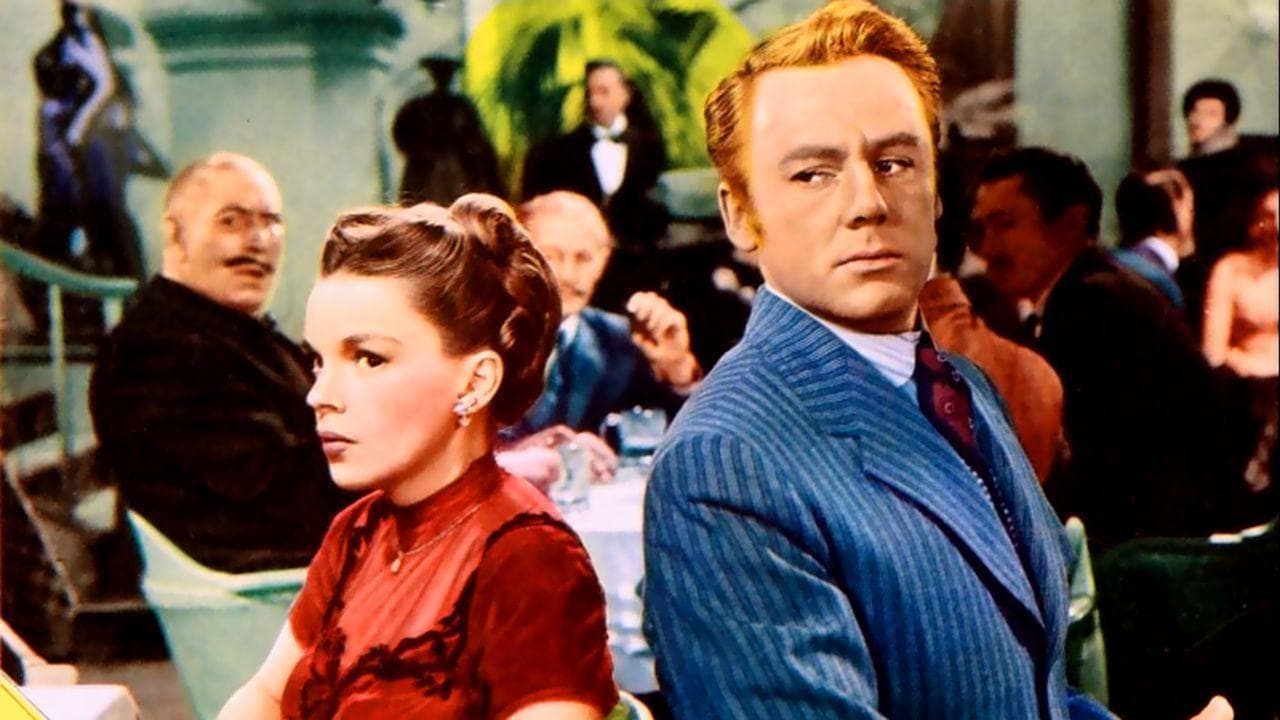lugonian
IN THE GOOD OLD SUMMERTIME (A Metro-Goldwyn-Mayer Silver Anniversary Picture, 1949), directed by Robert Z. Leonard, is not exactly a beach movie, nor a movie taking place entirely in the good old summertime, but one of the many nostalgic musicals with old-time music commonly produced during the time. Following the formula turn-of-the century pattern made popular by 20th Century-Fox with those starring Alice Faye, Betty Grable or June Haver, this MGM Technicolor release consists of its own studio contract players of Judy Garland and Van Johnson for the first and only time together. The plot, taken from the screenplay by Samson Raphaelson, was, in turn, a remake of MGM's earlier comedy-drama adaptation titled THE SHOP AROUND THE CORNER (1940) featuring Margaret Sullavan and James Stewart in the Garland and Johnson roles, switching its locale and time frame from contemporary Budapest, Hungary, to turn-of-the century Chicago, Illinois.As the camera captures the modern view of Chicago, it soon shifts back to in old Chicago of the early 1900s with the narration and introduction by Andrew Delby Larkin (Van Johnson). Larkin, a single man living in a boarding house, works as head salesman at $15 a week for Oberkogen Music Company with violin playing Otto Oberkogen (S.Z. Sakall, in a role originated by Frank Morgan in 1940) in charge. Also under his employ are Nellie Burke (Spring Byington), cashier, accountant, secretary and Mr. Oberkogen's love interest for twenty years; Hickey (Buster Keaton), Oberkogen's bumbling nephew; and Rudy Hansen (Clinton Sundberg) the sales clerk. Although very good friends with Louise Parks (Marcia Van Dyke), Andrew really has no steady girlfriend. He does, however, communicate with a female pen-pal he writes to on a regular basis, a girl he has yet to meet. As he comes onto the post office steps to get one of those letters, Andrew bumps into a passerby named Veronica Fisher (Judy Garland). Their introduction followed by a series of unforeseen mishaps finds Andrew giving this young lady his business card where he could be reached to help pay for any damages to her wardrobe. Later in the day, Veronica enters the music store where he works. Rather than coming for the money, she asks Andrew for a job. As he tries to discourage her, she proves herself capable to Mr. Oberkogen after selling a harp to a customer. As a new member of the team, Veronica is well liked by all except Andrew, each unaware the "dear friend" letters they write every evening happens to be to each other.In between the Veronica/Andrew bickering, old-time songs featured include: "In the Good Old Summertime," "Meet Me Tonight in Dream Land," "Put Your Arms Around Me Honey, Hold Me Tight," "Wait Till the Sun Shines, Nellie," "Play the Barber Shop Chord," "I Don't Care," Violin Concerto; "Merry Christmas" and "In the Good Old Summertime" (reprise/finale). The film's best moments, contributed to Judy Garland's oft singing, are highlighted by her energetic solo effort of "I Don't Care." Though "Merry Christmas" is another good Christmas song Garland introduced to the screen, it's not as famous as her earlier treatment to "Have Yourself a Very Merry Christmas" from MEET ME IN ST. LOUIS (1944).Overall, IN THE GOOD OLD SUMMERTIME actually belongs to Van Johnson. Introducing himself through off-screen narration for its opening segment, it's somewhat odd that Garland, its full-fledge star, didn't do a similar introduction to herself prior to their hilarious first meeting reminiscent to those great silent film comedy days of Buster Keaton, the one possibly responsible for this great gag material. As in the days of old, Keaton's pratfalls and bumbling character is further evidence how he's still being capable of getting audience attention and laughs all to himself, whether he'd be his humble self or doing his traditional hapless "Buster" character. Aside from the benefit of such likable co-stars as S.Z. Sakall and Spring Byington, there's also Lillian Bronson as Veronica's Aunt Addie; and in smaller roles, Charles Smith ("Dizzy" from Paramount's "Henry Aldrich" film series (1941-1944) as one of the members of the singing quartet; and little Liza Minnelli, Judy Garland's daughter, briefly captured before the film's conclusion.Using the same basic premise of THE SHOP AROUND THE CORNER, with added songs and straightforward comedy, IN THE GOOD OLD SUMMERTIME, formerly on video cassette, currently on DVD, is good enough entertainment to enjoy not only during the Christmas season whenever shown on Turner Classic Movies, but anytime of the year. (***)
weezeralfalfa
Yet another of the many 'minor' musicals of the '40s and '50s with a nostalgic theme: this time scripted as being in turn of the century Chicago. Unlike many, there's no pretense of remembering a specific notable composer or performer. Unlike many, neither of the lead characters is scripted as being a professional musical performer, composer or director. Rather, they work in a sizable music store, selling instruments and sheet music. Inimical 'Cuddles' Sakall, as the elderly owner(Otto Oberkugen) is his usual irascible self, with thick Hungarian -derived accent. Notable motherly stage, film and TV character actor Spring Byrington plays Nellie, Otto's perennial secretary, girlfriend and sometimes alter ego. Clinton Sundberg and Buster Keaton play rather anonymous salesmen. Sundberg was typecast playing minor characters. I remember him as the bartender in "Easter Parade", and the extraordinarily formal butler in "The Girl Next Door". Buster wasn't originally planned to be in the film, as he was employed by MGM as a gag deviser and occasional director of gags. However, none of the other appropriate actors could do a convincing pratfall that apparently destroys Otto's cherished Stradivarius violin. Thus, he was included so that he could do this scene. Also, apparently he devised and directed the hilarious slapstick initial encounter of Van Johnson's and Judy's characters. Judy was used to doing slapstick while in her family vaudeville acts, refreshed in "The Pirate" the year before. But, Van was a light comedian, along with a passable singer, dancer and dramatic actor. Like Jimmy Stewart, he was tall and thin, with boyish good looks, and popular with audiences. Thus, he was a rather good replacement for Stewart, who costarred in "The Shop around the Corner", upon which this musical version is based. He had also costarred with June Allyson in a musical. June was slated to costar in this film, until a pregnancy induced a last minute substitution with Judy. Thus, the musical numbers weren't really selected with Judy in mind.Marcia Van Dyke, as Judy's apparent rival for Van's matrimonial ambitions, was an actual professional violinist and occasional actress. If I were Van's character(Mr. Larkin), I'd probably have chosen her character(Louise) over the temperamental manic/depressive Veronica(Judy). She appears to be from a wealthy family, whereas Veronica appears to be a struggling music-knowledgeable shopgirl, insecure in her worth as a romantic partner, hence resorting to corresponding with an unseen male pen pal, not even giving out her name!Although the setting for most of the film clearly is in winter, close to Christmas, the title does make sense in that the title song is sung near the beginning and again at the end, when the setting clearly is in the warm season. Judy does sing one Christmasy song: "Merry Christmas". Unfortunately, her character is upset then, resulting in a very somber rendition. While the melody is undistinguished, the lyrics are quite good. In addition to the title song, the well known period songs by brothers Harry or Albert von Tilzer: "Put Your Arms Around Me", and "Wait 'Till the Sun Shines, Nellie" are featured: the latter sung by a somewhat comical barbershop quartet, who also accompany Judy in "Play that Barbershop Chord". Judy previously sang the period lullaby-like waltz "Meet Me Tonight in Dreamland". Judy's biggest production number is to the exuberant period "I Don't Care", as part of the festivities relating to the party put on by Otto and Nellie to announce their long-anticipated engagement. Actually, all these 'period' songs were composed in the first decade of the 20th century, rather than in the '90s. Unfortunately, Mr. Larkin(Van) is characterized as having no singing talent, hence he doesn't sing nor dance. There is no real dance production. The drama reaches a peak in the last portion, when Otto insists on playing his Stradivarius violin at his engagement party. Poor Nellie doesn't want to be embarrassed by his less than stellar talent, hence pleads with Larkin to find an excuse why his violin can't be there. Larkin decides to exchange violins with Louise's, hence giving Louise a better chance to win in the contest that same evening. Larkin shuffles back and forth between the engagement party and violin competition. Keaton accidentally smashes Louise's violin trying to give it to Otto, believing it to be the Stradivarius. Otto, Nellie and Veronica(Judy) rush over to the violin competition to retrieve Otto's Stradivarius, but are mesmerized by Louise's performance. Veronica sees an apparent romantic relationship between Larkin and Louise, and is fearful. Initially, Otto fires Larkin, but then makes him store manager, and gives Louise the Stradivarius. Veronica decides to quit the store so she won't have to see Larkin anymore, and concentrate on trying to land her anonymous pen pal. Larkin says he has met her pen pal and gives a very unfavorable description, upsetting Veronica, before revealing that it is him. Veronica now is pleased.The love/hate relationship between Larkin and Veronica, with an alternative beau as the apparent favorite though most of the film, was a very common screenplay plot in musicals of this era. This may be disturbing to some viewers, but no doubt somewhat reflects the history of a minority of actual marriages.
enddetour
Plot: Pen pals fall in love on paper and (unwittingly) battle each other at work, with music! Drive-in Rating: Pull over and watch! Absolutely enjoyable and mostly faithful to the original of 1940, now located in Chicago and with the added perk of Judy Garland in song (and dance). For the modern viewer, this may be an easier transition to the original plot than the black and white original, "The Shop Around the Corner." Also recommend considering which star is a bigger draw for you (Judy or Jimmy Stewart). If you've enjoyed "Meet Me in St. Louis," odds are you'll enjoy this, though Meet Me
is far more acclaimed. This version gives you the added benefit of silent movie great Buster Keaton (yes, he talks) and dashing all-American leading man Van Johnson.
moonspinner55
Musical remake of "The Shop Around the Corner" from 1940 concerns a bachelor (Van Johnson) in 1930s Chicago who shares an intriguing pen-pal relationship with a single gal (Judy Garland), unaware his mystery lady is actually the brash co-worker whom he hates. MGM product with decidedly less gloss and panache than usual. The leads do all right, supporting cast (including S.Z. 'Cuddles' Sakall and Buster Keaton, who reportedly directed some scenes) is very good, but the songs are middling and the story seems to take forever to wind up. Liza Minnelli makes her screen debut here...as the dark-eyed, ruby-lipped toddler in the final scene. Material was later transformed into a Broadway musical entitled "She Loves Me", and was the basis yet again for 1998's "You've Got Mail". ** from ****



 AD
AD




